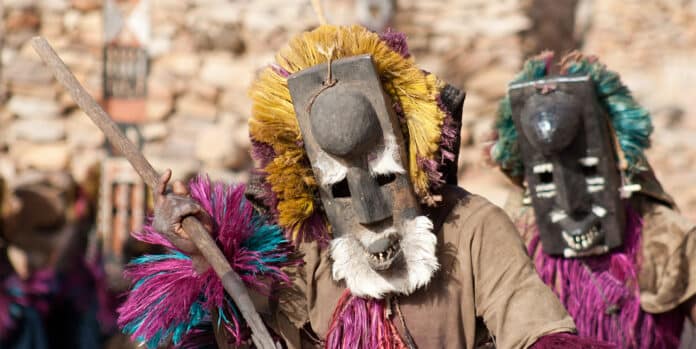Nestled in the breathtaking cliffs and plateaus of Mali, West Africa lies a civilization shrouded in mystery and wonder—the Dogon Tribe. This ancient ethnic group has captured the fascination of anthropologists, historians, and adventurers for decades, thanks to their remarkable isolation, unique traditions, and profound connection to the cosmos.
In this article, we embark on a journey to explore the captivating world of the Dogon people, delving into their enigmatic culture, extraordinary cliff-dwelling lifestyle, and timeless wisdom that continues to inspire awe and curiosity.
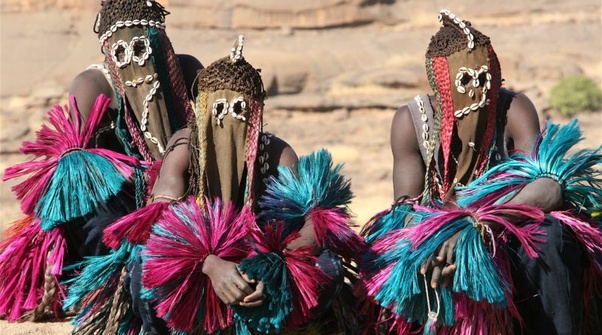
From their intricate knowledge of astronomy to their rich spiritual beliefs, the Dogon Tribe stands as a testament to indigenous culture’s enduring allure and intricate relationship with the natural world. Join us as we unveil the secrets of the Dogon Tribe, a living testament to the power of tradition and the depth of human ingenuity.
Read Also: The Himba Tribe: Meet the Distinctive Red People of Namibia whose Culture Intrigues Many
Which People Constitute the Dogon tribe?
The Dogon Tribe is an indigenous ethnic group located in Mali, West Africa. They are known for their distinct culture, language, and traditions. The Dogon people primarily inhabit the Bandiagara Escarpment, a region in central Mali, where their cliff-dwelling villages are perched on sandstone cliffs.
The Dogon Tribe is composed of several different clans and communities, all sharing a common language and many aspects of their traditional way of life. The Dogon people are renowned for their intricate knowledge of astronomy, complex religious beliefs, and unique artistic expressions, including their distinctive wooden sculptures and masks.
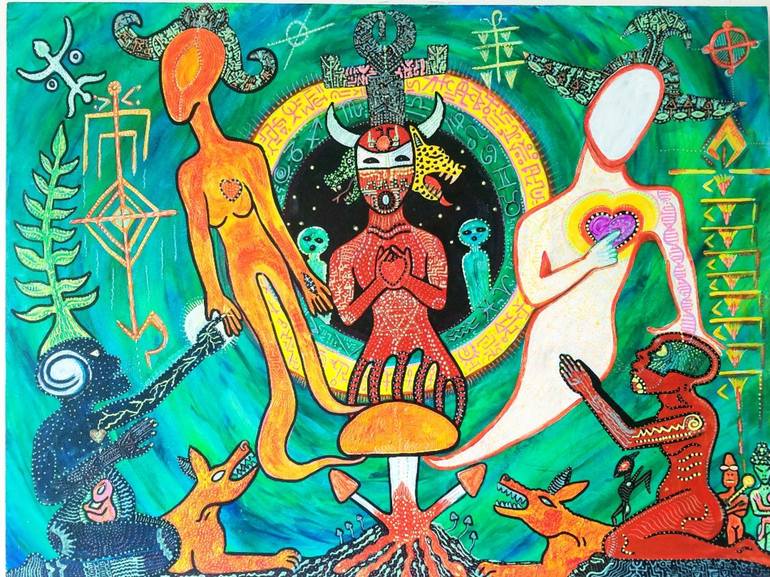
They have a rich oral tradition that passes down their cultural and spiritual knowledge from one generation to the next. The Dogon culture has attracted the interest of researchers and enthusiasts worldwide due to its enigmatic and unique characteristics.
Best Practices Peculiar to the Dogon Tribe
The Dogon Tribe of Mali has distinct cultural practices that have been preserved for generations. While it’s important to approach their practices with respect and understanding, here are some of the best practices that are peculiar to the Dogon Tribe:
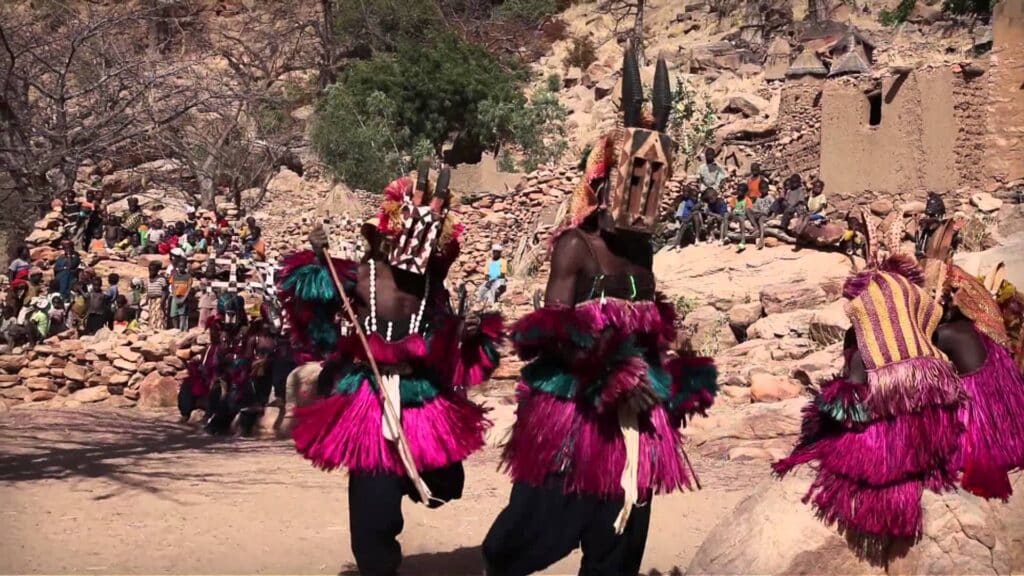
- Oral Tradition and Storytelling: The Dogon culture relies heavily on oral tradition to pass down their history, myths, and knowledge. Storytelling is a cherished practice, and elders play a vital role in transmitting wisdom to the younger generations through narratives.
- Cliff-Dwelling Architecture: The Dogon are known for their unique architecture, building their homes on the cliffs and plateaus of the Bandiagara Escarpment. These structures not only serve as protection from potential invaders but also symbolize their connection to the earth and the cosmos.
- Sculpture and Art: The Dogon are renowned for their intricate wooden sculptures, masks, and artistic expressions. These pieces often have cultural or spiritual significance, and they play a role in religious ceremonies and rites of passage.
- Astronomy Knowledge: The Dogon are celebrated for their profound knowledge of astronomy, particularly their understanding of the Sirius star system. Their cosmological beliefs and astronomical practices are intricately woven into their culture and religious ceremonies.
- Animism and Ancestor Worship: The Dogon follow animistic beliefs, revering the spirits of their ancestors and various natural elements. Their religious practices involve rituals, ceremonies, and dances to honour these spirits and maintain harmony within the community.
- Social Structure: The Dogon society is organized into a hierarchical structure, with various age-grade societies, each with specific roles and responsibilities. Elders hold a position of authority and wisdom in the community.
- Masked Dances and Rituals: Masks hold a special place in Dogon culture. They are used in various ceremonies and dances to represent ancestral spirits and to convey messages in religious and social contexts.
- Gender Roles: The Dogon has specific gender roles and division of labour. Men and women have their responsibilities within the community, and their roles are deeply embedded in their culture.
- Music and Dance: Music and dance are integral to Dogon ceremonies and rituals. They use drums, flutes, and other instruments, accompanied by energetic dances, to express their cultural identity and spirituality.
It’s essential to approach the Dogon culture with respect and a willingness to learn. Visitors or researchers must be sensitive to their traditions and seek permission when participating in their rituals or events. Respecting their way of life and preserving their cultural practices is of utmost importance.
Read Also: Dinka tribe of South Sudan; World’s tallest people
Facts About the Dogon Tribe
The Dogon Tribe is a unique and culturally rich ethnic group in Mali, West Africa. Here are some interesting facts about the Dogon Tribe:
- Cliff-Dwelling Villages: The Dogon are known for their distinctive cliff-dwelling villages, which are perched on the sandstone cliffs of the Bandiagara Escarpment. These villages have been inhabited for centuries and are an architectural wonder.
- Astronomical Knowledge: The Dogon are famous for their advanced knowledge of astronomy, particularly their understanding of the Sirius star system. Their cosmological beliefs and rituals are deeply intertwined with their astronomical observations.
- Oral Tradition: The Dogon people have a rich oral tradition. Their history, myths, and cultural knowledge are passed down through storytelling and oral transmission from generation to generation.
- Animistic Beliefs: The Dogon follow animistic beliefs, where they venerate the spirits of their ancestors and various natural elements. They believe in maintaining harmony with the spirits to ensure the well-being of their community.
- Masked Dances: Masked dances are an integral part of Dogon culture. They are used in religious ceremonies and rituals to represent ancestral spirits and convey messages. The masks are intricately crafted and have symbolic significance.
- Social Structure: The Dogon have a complex social structure with various age-grade societies. Each society has its specific roles and responsibilities within the community.
- Gender Roles: Traditional gender roles are well-defined in Dogon society. Men and women have distinct roles in daily life, with men often responsible for tasks like farming and women for food preparation and household duties.
- Artistic Expression: Dogon artists are known for their wooden sculptures, masks, and intricate artwork. These pieces often depict spiritual and cultural themes and are used in various ceremonies and rituals.
- Music and Dance: Music and dance are essential components of Dogon culture. They use traditional instruments such as drums, flutes, and xylophones, accompanied by energetic dances, to celebrate their cultural identity and spirituality.
- Communal Living: The Dogon strongly emphasises communal living and cooperation. Villagers work together to build and maintain their cliff-dwelling communities and share resources for the well-being of all.
- Unique Language: The Dogon people speak their language, called Dogon, which is a complex language with several dialects. It’s an important part of their cultural identity.
- Remote and Isolated: The Dogon region is quite remote and isolated, making it challenging to access. This isolation has contributed to the preservation of their unique culture and traditions.
- UNESCO World Heritage Site: The Bandiagara Escarpment, where many Dogon villages are located, is a UNESCO World Heritage Site due to its cultural and historical significance.
The Dogon Tribe’s rich history, cultural practices, and unique way of life have fascinated researchers and visitors for years, and they continue to be a source of cultural wonder and inspiration.
The Dogon Tribe’s Belief
The Dogon Tribe has a complex and intricate belief system deeply intertwined with its cultural and spiritual practices. Here are some key aspects of Dogon belief:
- Ancestral Worship: The Dogon people venerate their ancestors and believe in the presence of ancestral spirits. These spirits are thought to influence daily life, and rituals and offerings are made to honour and seek guidance from them.
- Nature and Animism: Animism is a central tenet of Dogon spirituality. They believe that spirits inhabit various natural elements, including trees, rocks, and bodies of water. The Dogon maintains a harmonious relationship with these spirits to ensure the well-being of their community.
- Cosmological Beliefs: The Dogon are renowned for their knowledge of astronomy and their cosmological beliefs. They deeply understand the Sirius star system, particularly Sirius B. This knowledge is woven into their creation myths and religious rituals.
- Nommo: The Dogon has a mythic figure known as “Nommo.” Nommo represents the first created being and is associated with the creation of the world. Nommo is often depicted in Dogon art and mythology.
- Role of Priests: The Dogon have religious leaders and priests who play a central role in the community’s spiritual life. They are responsible for conducting rituals, interpreting omens, and maintaining the harmony between the living and the spirit world.
- Dama Festival: The Dama Festival is a significant Dogon celebration held every six years. It is a complex and elaborate event that involves masked dances, reenactments of Dogon myths, and the honouring of deceased ancestors.
- Masked Dances: Masks hold great importance in Dogon culture. They are used in various ceremonies to represent ancestral spirits and convey messages. The masks are believed to possess spiritual power and are considered sacred.
- Initiation Rites: The Dogon have initiation rites that mark important life transitions, such as coming of age. These rites often involve secret knowledge and rituals that are passed down through generations.
- Sacred Sites: The Dogon have specific holy sites and shrines where rituals and offerings are made to appease spirits and seek their blessings.
The Dogon belief system is a rich tapestry of spirituality, astronomy, and mythology, reflecting their deep connection to the natural and spiritual realms. It is a testament to indigenous African societies’ cultural complexity and diversity.
Read Also: Meet the Sambia tribe where boys drink semen to become men
The Dogon Tribe Sirius
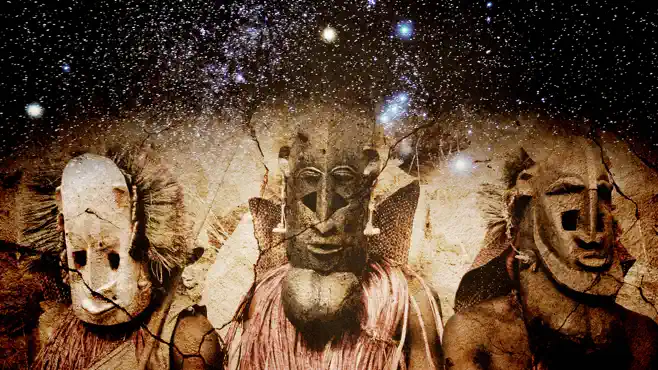
The Dogon Tribe’s knowledge of the Sirius star system, particularly Sirius B, is one of the most intriguing aspects of their culture and has captured the fascination of researchers and scholars for many years.
Sirius is the brightest star in Earth’s night sky and is often referred to as the “Dog Star.” Here is some information about the Dogon Tribe’s beliefs and knowledge regarding Sirius:
- Sirius B: The Dogon people have a specific focus on Sirius B, which is a white dwarf star that orbits around Sirius A, the brighter and more prominent of the two stars in the Sirius system. While Sirius A is visible to the naked eye, Sirius B is much dimmer and requires a telescope to observe.
- Detailed Knowledge: The Dogon are known for their remarkably detailed knowledge of the Sirius system despite the limited technological resources available to them. Their understanding of the existence of Sirius B and its elliptical orbit around Sirius A is particularly striking.
- Oral Tradition: The Dogon’s knowledge of Sirius B has been passed down through generations in their oral tradition. They have complex myths and stories related to the Sirius system that is used to teach and preserve this knowledge.
- Astronomy and Cosmology: The Dogon’s cosmology is intertwined with their knowledge of the Sirius system. They believe that the movement and characteristics of the stars in the Sirius system have significant spiritual and cosmological implications.
- Nommo: In Dogon mythology, Nommo is a mythic figure associated with the creation of the world. Nommo is sometimes linked to the Sirius system and is considered a central figure in Dogon’s spiritual beliefs.
- Alignment with Celestial Events: The Dogon people have ceremonies and rituals that align with specific celestial events related to the Sirius system, such as the rising of Sirius in the night sky. These ceremonies are considered crucial to maintaining the balance and well-being of their community.
- Controversy and Research: The Dogon’s knowledge of Sirius has sparked controversy and extensive research. Some scholars suggest that the Dogon may have received this astronomical knowledge from ancient contact with other advanced civilizations. However, others argue that the Dogon’s knowledge could have been developed independently through their keen observations of the night sky.
The Dogon Tribe’s knowledge of the Sirius system remains a topic of fascination and debate, and it underscores the remarkable depth of indigenous knowledge and the potential for advanced astronomical understanding even in societies with limited technological resources.
The Dogon Tribe Cosmology
The cosmology of the Dogon Tribe is a complex and intricate belief system deeply rooted in their cultural and spiritual practices. Their cosmology is intertwined with their understanding of the universe, the stars, and their place within the cosmos. Here are some key aspects of Dogon cosmology:
- Sirius and Po Tolo: Central to Dogon cosmology is the Sirius star system, particularly the binary stars Sirius A and Sirius B. The Dogon refer to Sirius B as “Po Tolo” or the “Star of Women.” They believe that Po Tolo is an important celestial body that has spiritual significance.
- Nommo: The Dogon believe that Nommo is a mythic ancestral figure who was created by the divine entity Amma and sent to Earth to teach humanity about the cosmos. Nommo is often associated with the creation of the world and is considered a crucial link between the spiritual and physical realms.
- Four Worlds: The Dogon cosmology posits the existence of four worlds or cosmic levels. These are the realm of the divine (Amma), the realm of the spiritual ancestors, the realm of the living, and the realm of the dead. Each of these worlds plays a distinct role in the Dogon worldview.
- Balance and Harmony: The Dogon believe in the importance of maintaining balance and harmony within the cosmos. This balance is achieved through various rituals, ceremonies, and offerings to appease the spirits and maintain the well-being of the community.
- Role of the Hogon: The Hogon is the spiritual leader and religious authority in Dogon society. They are responsible for conducting rituals, interpreting omens, and maintaining the spiritual order within the community.
- Sacred Sites and Shrines: The Dogon have specific holy sites and shrines where they perform rituals and make offerings to the spirits. These locations are considered to be portals to the spirit world and play a vital role in their cosmology.
- Rituals and Ceremonies: Dogon cosmology is expressed through a wide range of rituals and ceremonies. These include masked dances, initiation rites, and communal celebrations that honour the spirits and ancestors.
- Harmonious Living: The Dogon’s cosmological beliefs guide their way of life. They emphasize the importance of living in harmony with nature, the community, and the spirit world. This harmonious existence is seen as essential for the well-being of the entire tribe.
- Oral Tradition: Much of the knowledge and stories related to Dogon cosmology are passed down through oral tradition. Elders and spiritual leaders are responsible for teaching the younger generations about their cosmological beliefs.
- Astronomical Connections: The Dogon’s knowledge of the Sirius star system is intricately linked to their cosmology. They believe that celestial events and the movements of the stars have profound spiritual and cosmic implications.
The Dogon cosmology is a rich and complex belief system that reflects their deep connection to the spiritual and natural worlds. It underscores the significance of maintaining balance and harmony in their lives and the cosmos.
The Dogon Tribe and Anthropology
The Dogon Tribe has fascinated anthropologists and researchers for many years due to its unique cultural practices, remarkable cliff-dwelling villages, and profound knowledge of astronomy. Here are some insights into the relationship between the Dogon Tribe and the field of anthropology:
- Cultural Significance: The Dogon culture is known for its distinct practices, including its cliff-dwelling architecture, masked dances, and oral traditions. Anthropologists have studied these cultural elements to gain a deeper understanding of their significance and the role they play in Dogon society.
- Oral Tradition: Anthropologists have explored the Dogon’s oral tradition, which serves as a primary means of passing down cultural knowledge, myths, and history. This oral tradition is crucial for preserving the tribe’s cultural heritage.
- Religious Practices: The complex religious beliefs and rituals of the Dogon Tribe have been a focal point of anthropological research. Scholars have examined their animistic beliefs, ancestor worship, and ceremonies to understand how spirituality is intertwined with daily life.
- Astronomy and Cosmology: The Dogon’s knowledge of astronomy and cosmology, particularly their understanding of the Sirius star system, has piqued the interest of anthropologists and astronomers alike. Researchers have explored the origins of this knowledge and its cultural significance.
- Art and Artistic Expression: Dogon art, including wooden sculptures and masks, has been the subject of anthropological study. Scholars have delved into the symbolism and cultural meanings behind these artistic expressions.
- Social Structure: The Dogon’s social structure, with its age-grade societies and roles for elders, has been a topic of anthropological investigation. Understanding how their society is organized and the roles of various community members provides insights into their way of life.
- Gender Roles: Anthropologists have examined the division of labour and gender roles within Dogon society. This research sheds light on how men and women contribute to the community and their respective responsibilities.
- Cosmological Beliefs: Anthropologists have studied the intricate cosmological beliefs of the Dogon Tribe, focusing on their beliefs in spirits, ancestral worship, and the balance of the cosmos. These beliefs are essential for comprehending the worldview of the tribe.
- Rituals and Ceremonies: Anthropologists have participated in or observed Dogon rituals and ceremonies to document their significance and the role they play in maintaining community cohesion and spirituality.
- Societal Changes and Preservation: Researchers have also explored how modernization and external influences impact the Dogon culture. Efforts to preserve their traditions and way of life in the face of changing circumstances have been of anthropological interest.
Anthropological research on the Dogon Tribe continues to contribute to our understanding of indigenous cultures, the preservation of cultural heritage, and the profound interconnection between cultural practices and the natural world.
Read Also: Meet the El Molo tribe of Kenya where 1 person must die when another is born
The Myths About the Dogon Tribe
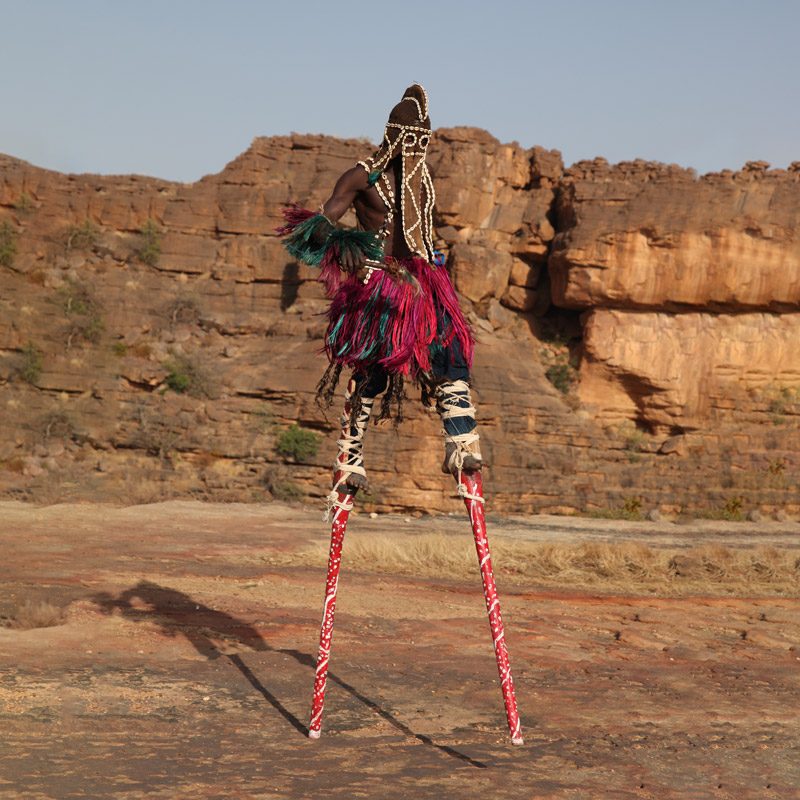
The Dogon Tribe of Mali has a rich oral tradition filled with myths and legends passed down from generation to generation. These myths play a significant role in their cultural and spiritual beliefs.
While the specific myths and stories can vary from one Dogon community to another, here are some common themes and myths associated with the Dogon Tribe:
- Creation Myth: The Dogon has a myth involving the divine entity Amma. In their mythology, Amma is the creator of the universe and all living beings. The story often includes the figure of Nommo, a mythical being associated with the creation of the world.
- Nommo Myth: Nommo is a central figure in Dogon mythology. It is believed that Nommo was the first being created by Amma and was sent to Earth to teach humanity about the cosmos. The Dogon often associate Nommo with the Sirius star system.
- The Nommo Twins: The Dogon mythology includes the idea of Nommo twins. These twins, often depicted as amphibious beings, play a crucial role in the Dogon’s understanding of creation, the four worlds, and the balance within the cosmos.
- The Lebe Myth: Lebe is another important figure in Dogon mythology. Lebe is associated with the Moon and is considered a messenger of Amma. The Dogon believe that Lebe brings messages and guidance to humanity.
- The Fox and the Jackal: The Dogon have stories about the clever fox and the cunning jackal. These tales often carry moral lessons and are used to teach values and principles to younger generations.
- Origin of Death: Dogon mythology addresses the issue of death and its origins. They have stories about how death came into the world, often involving a transgression by humans or celestial beings.
- Myths About the Stars: The Dogon are renowned for their astronomical knowledge and have myths about the Sirius star system. These myths explain the significance of Sirius B (Po Tolo) and its connection to Nommo and human existence.
- Rituals and Ceremonies: Many Dogon myths are enacted in their rituals and ceremonies. For example, the Dama Festival involves reenactments of Dogon myths, masked dances, and other performances.
- The Earth and Nature: Dogon mythology emphasizes the importance of nature and the Earth. They have stories about the creation of the Earth and the need to live in harmony with the natural world.
- Spiritual Beings: Dogon mythology features a wide array of spiritual beings, including ancestors, spirits of nature, and celestial entities. These beings are believed to influence daily life and require offerings and rituals to maintain their favour.
The myths and legends of the Dogon Tribe are a vital part of their cultural heritage and serve as a way to pass down knowledge, values, and spiritual beliefs. These stories are central to their understanding of the cosmos and their place within it.
Read Also: Meet the Himba tribe of Namibia who don’t bathe for months
Challenges and Preservation of the Dogon Culture
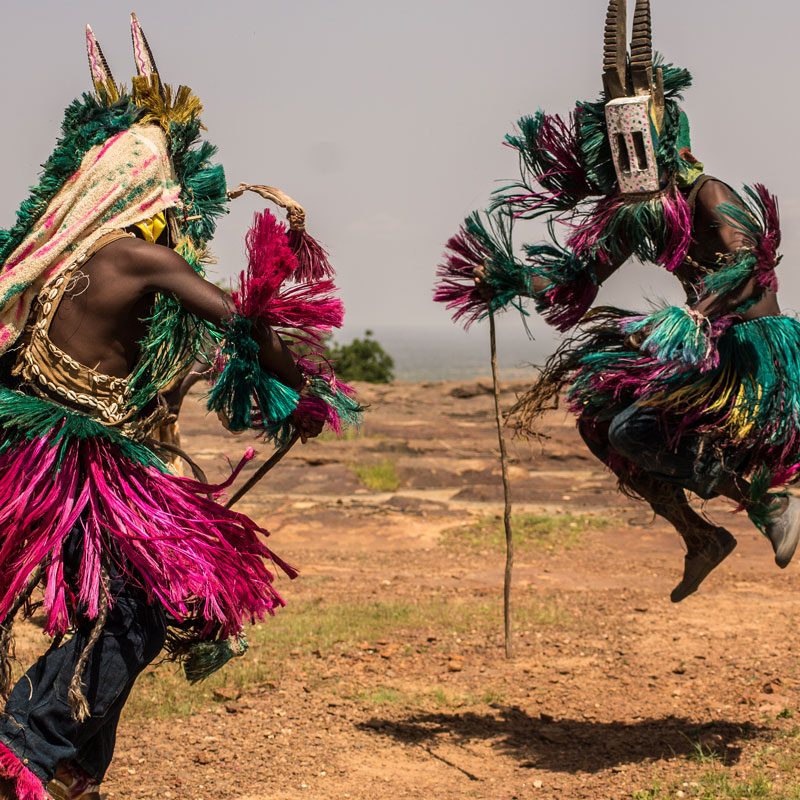
The Dogon Tribe faces several challenges that impact the preservation of their culture and way of life. Some of these challenges include:
- Modernization: The encroachment of modernization and external influences can erode traditional practices and values. Access to modern amenities, education, and alternative livelihoods may draw younger generations away from traditional Dogon occupations and customs.
- Environmental Factors: Climate change, drought, and unpredictable weather patterns can have a significant impact on agriculture, which is a vital aspect of the Dogon economy. These factors can threaten food security and the sustainability of the cliff-dwelling villages.
- Preservation of Oral Traditions: The transmission of knowledge through oral tradition is at risk due to the availability of written and digital resources. It’s essential to find ways to preserve and pass down their unique stories, myths, and history.
- Tourism: While tourism can provide economic opportunities for the Dogon people, it also brings the risk of cultural commodification and disruption. Striking a balance between preserving their culture and benefiting from tourism is a challenge.
- Education: Ensuring access to quality education while preserving cultural traditions can be a delicate balance. Modern education systems may not always align with Dogon’s values and practices.
- External Influences: The Dogon Tribe is not isolated from the broader global context. The influence of neighbouring cultures and international trends can impact their way of life.
To address these challenges, there are efforts to promote cultural preservation and sustainable development within Dogon communities. Organizations, researchers, and international partners collaborate with the Dogon people to find ways to protect their cultural heritage while adapting to the changing world.
See Also: The Melanesians: Blonde African People of the Solomon Islands
Conclusion
The Dogon Tribe of Mali is a captivating and enigmatic culture that continues to inspire awe and curiosity. Their cliff-dwelling villages, intricate knowledge of astronomy, complex cosmology, and profound spiritual beliefs have fascinated researchers and visitors alike.
The Dogon’s oral traditions, myths, and cultural practices are vital components of their identity, and their ability to maintain a deep connection to both the natural and spiritual worlds is a testament to the richness and diversity of indigenous African societies.
While they face challenges in preserving their culture in the modern world, efforts are being made to protect their heritage and way of life for future generations.
FAQs for Dogon Tribe
What are the Dogons known for?
The Dogon people are known for their legends about their origins and knowledge about space and extraterrestrials. The Dogon people are also famous for their intricately carved wooden masks and dance rituals for the deceased, a ritual known as the dama.
What are the Dogons’ myths?
According to Dogon’s myth, some undefined impulse caused this egg to open, allowing it to release a whirlwind that spun silently and scattered its contents in all directions, ultimately forming all of the spiraling galaxies of stars and planets.
Why does the Dogon wear a mask?
Like other Dogon masks, Kanaga masks are worn at rituals called dama, whose goal is to transport the souls of deceased family members away from the village and to enhance the prestige of the deceased and his descendants through magnificent masked performances and generous displays of hospitality.
How does the Dogon know about Sirius?
Temple’s book says that long ago, an ark descended to the ground amid a great wind and brought amphibious beings, known as the Nommo, who gave the Dogon the scoop on Sirius B.
What astronomical knowledge do the Dogon people have?
The Dogon people have a rich astronomical knowledge, including detailed descriptions of the stars and planets.



